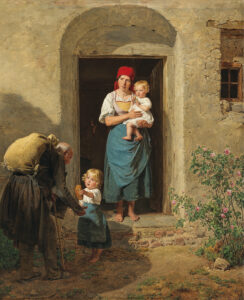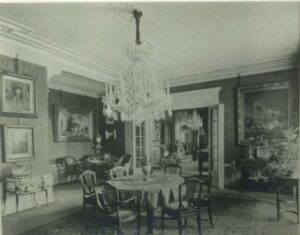 The Vision Foundation has received a fundraising boost following the auction of a painting in Vienna, Austria.
The Vision Foundation has received a fundraising boost following the auction of a painting in Vienna, Austria.
The Compassionate Child (The Beggar) by the leading 19th century Austrian artist Ferdinand Georg Waldmüller, which was seized for Hitler’s planned Führermuseum in Linz and recently restituted, sold for €240,000, exceeding its top estimate by €40,000.
The sale at the world famous Dorotheum auction house brings to a close an incredible tale of lost art, Nazi Germany and a charitable legacy.
In 1938, Irma and Oscar Löwenstein, prominent members of Vienna’s Jewish community, escaped from Nazi oppression to London with their lives but not their many valuable artworks. Oscar died soon after they arrived and while Irma spent the rest of her life trying to reclaim her treasures, time and post-war politics meant she never saw them again.
Although she remarried and became Mrs Austin, Irma Löwenstein Austin had no heir and when she died in 1976, she left her estate to the Greater London Fund for the Blind, now the Vision Foundation. Her art collection, which had been sold under duress, remained unaccounted for.
Artworks discovered
In 2018, the charity learned that three Waldmüller paintings from the collection had come to light in museums in Munich, Dortmund and Berlin and as the beneficiaries of Irma Löwenstein Austin’s will, it had rights of restitution.
To find that it was the lawful owner of three important works of art came as a complete surprise to the Vision Foundation. The world of looted Nazi art is murky and complex and only the pro bono help of the art lawyers at international law firm Charles Russell Speechlys to steer through the cross border jurisdictional interplay of Austrian, German and English law, made it possible to bring the paintings to auction.
Rudy Capildeo, Partner and art lawyer specialist at Charles Russell Speechlys, explains, “This is a tragic yet fascinating story and a wonderful legacy to support. The restitution of these artworks was complex and required careful navigation of various laws.” He continues, “It has been a real honour to help support the legacy of the Vision Foundation. We hope the sale of this piece will boost the future growth of the charity and help transform and empower the lives of London’s visually impaired community.”
Explains Olivia Curno, chief executive of the Vision Foundation, “Legacies are vital to the Vision Foundation and this one, which brings with it such a powerful story of loss, is particularly poignant, as well of course as being hugely generous and quite unexpected. However, it was also something we’d never encountered in our hundred-year history and the advice we’ve received from Charles Russell Speechlys, Cadell + Co and the Dorotheum has been invaluable.”
Specialist support
Art consultants Cadell + Co advised pro bono how best to bring the Waldmüller works to the attention of his many admirers and collectors. “The Compassionate Child (The Beggar) is considered the most valuable of the three restituted Waldmüller paintings and we expect it to fetch between €150,000 – 200,000,” says Cadell co-founder Willem de Gier. “It was clearly a favourite of the Löwensteins and can be seen in one of the surviving photographs of their Vienna apartment.”
“It feels particularly meaningful to be benefiting from this bequest in the year of our 100th birthday,” says Olivia Curno. “We’re celebrating our centenary by launching an appeal to address the shockingly poor employment rates of visually impaired people. Because they are so often excluded from work, 66% of blind and partially sighted people live in poverty, and tell us they feel isolated and excluded. The funds raised by these three paintings will help us to deliver projects which empower people, educate employers, and change policy and public attitudes. Without Irma’s generous decision nearly 50 years ago, we wouldn’t be in a position to deliver this vital work.”

A family connection
Efforts to find anyone who might have known Irma Löwenstein Austin and to learn why she chose to leave her estate to the Vision Foundation led nowhere, until January 2021 when David Mills heard about the sale of the first two Waldmüller paintings. The only person still alive who remembers her, he explains, “I was Mrs Austin’s tenant and friend and helped her draft her will many years ago. It’s incredible to think that her legacy continues after all this time and I am sure that she would be really pleased to know that the painting has been recovered and that it will be helping people now, so many years later.”
Explains Olivia Curno, “It was very important to us to be able to make the connection to Irma Löwenstein Austin, whose generosity is of such enormous significance to the Vision Foundation and we were delighted to meet David Mills and learn more about our benefactor.”
The power of a legacy
In November 2020 the first two Waldmüllers were sold for €383,900 by Dorotheum, also acting pro bono by waiving its fee. Says Martin Böhm, managing partner Dorotheum, “Since its privatisation in early 2000, Dorotheum, with its in-house provenance department specialising in restitution research, has been regarded internationally as the first point of contact for Austrian art. Since then, many restitutions have been successfully carried out. We thank the Vision Foundation UK, for the trust they have placed in us.”
The Waldmüller paintings are three artworks from a collection which originally comprised dozens of very fine objects. The whereabouts of many of these works are still unknown.
Art historian Sophie Lillie, who was the first to feature the Löwenstein collection in her 2003 book ‘Was einmal war’, says: “Oskar and Irma Löwenstein owned one of Vienna’s preeminent pre-war private collections. Their lives were brutally destroyed by the Nazis. The return of this exceptional work ensures that the Löwensteins will finally receive the recognition they deserve as outstanding patrons of Austrian art and culture.”
Concludes Olivia Curno, “This is a real-life story about lost art seized by the Nazis but with a twist, which has turned the Vision Foundation into an unlikely art detective”.

